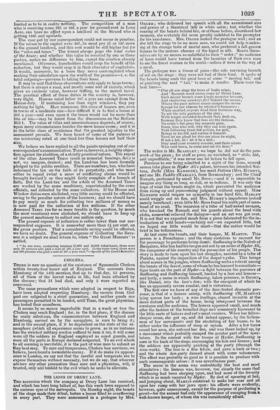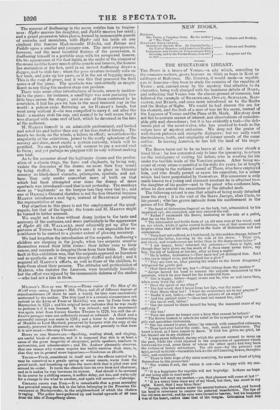THE LIONS OF DRURY LANE.
THE accession which the company at Drury Lane has received, and which has been long talked of, has this week been exposed to the curious eyes of the metropolis. On Monday night, the beasts of the stage made their debut, before a house filled to overflowing in every part. They were announced in a prologue by Mrs. ORGER ; who delivered her speech with all the accustomed airs and graces of a theatrical lady in white satin' but, whether the roaring of the beasts behind her, or of those before, disordered her memory, she certainly did seem greatly indebted to the prompter for his assistance. Mrs. ORGER looked the prologue well ; and as she left the stage to be no more seen, we could not help wonder- ing at the strange taste of mortal men, who preferred a full-grown lioness to the mature charms of the biped in silk. Beasts them- selves are by no means so unfaithful to their " order ;" no audience of lions would have turned from the beauties of their own race to see the finest woman in the world—unless it were in the way of a meal.
The prologue was a tissue of puns—the sole surviving branch of wit on the stage : they were not bad of their kind. It spoke of the beasts being each the great hero of some " moving tail," and of pinching the said " tail," to make it tender. These were the, best lines- " O'er all our stage the trees of India reign,
And • Burmah wood seems come to' Drury Lane. Each mimic branch some kingly monster screens, And chattering znonkeysjiirt behind the scenes; Where the poor actress scarce escapes the noose Spread for her charms by whisker'd kangaroos ; While mottled serpents wind their tortuous way, To act the wily portions of the play ; With length unfolded fearlessly they dash on, Because they know that boas are the fashion. No critic's fiat gives the serpents pain, Since, hiss who will, why they can hiss again. Next following them the pelican, for pelf, Brings in his bill, and carries it himself. Then let me plead for this our piece to-night, If not a hit, oh ! let it be a bite; Pray send your country cousins, and their scions Who visit town, to come and see the lions."
The writer is Mr. BEAZELEY ; we hope lie did not do the pen- work of the piece ; for stuff so poor, so wretched, so " stale, fiat, and unprofitable," it was never our lot before to fall upon. Previous to our being admitted to a sight of the lions, several scenes take place in Hyder s palace, between his intended Sul- tana, Delhi (Miss KENNETH), her maid Fatima (Mrs. Humny), and one Mr. Fuddle (HARLEY), from Bermondsey ; and the Chief Eunuch, performed by small Mr. Ross ;—and it is impossible to imagine any thing so long, so dull, or so tedious. It was only the hope of what the beasts might do, which prevented the audience from rising up and pronouncing judgment without appeal. Miss KENNETH could inspire no sympathy in her hard fate, HARLEY could wriggle out no fun, mid Mrs. HUNIBY.S impudence looked' merely barefaced ; even little Mr. Ross found his ninth part of man- hood of no avail. The incursion of a tribe of half-naked savages, who knocked the Eunuch and his guards about the head with' clubs, somewhat relieved the dialogue—and an act was got over. It is not that we expected much from a piece fabricated for the in- troduction of wild beasts—certainly not—we expected little, but we hoped our little would be short—that the author would be brief in his tediousness.
At last came the beasts, and their keeper, M. MARTIN. This person is a Frenchman ; and the story contrives to account for the personage he performs being dumb. Sadhusing is the Nabob of Bangalore, who has had his tongue cut out by an order of Hyder Ali,. the conqueror of his country and the persecutor of his people. The story is made to turn upon his last struggles, assisted by a tribe of Pariahs, against the imposition of the despot's yoke. This brings about scenes in the jungles, where Sadhusing seeks a retreat among. the beasts of the forest, some of whom he has learned to conciliate— tiger hunts on the part of Hyder—a fight between the pursuers of Sadhusing and Sadhusing himself, backed by a lion and lioness— and lastly, a scene in which Sadhusing, taken prisoner, is thrown,,... like Daniel, into the lion's den ; with the occupant of which he has an apparently severe combat, and is victorious. The first view we have of any of the four-footed dramatis per-. sonce, is that of a lioness asleep, with Sadhusing (M. MARTIN)' lying across her body ; a wire treillage, almost invisible at the more distant parts of the house, being interposed between the' creatures and the audience. The lioness appeared small, and much after the fashion of the brindled dogs now commonly harnessed to the little carts of bakers and cat's-meat-venders. When her fellow- sleeper arose, she got up, and did indeed appear, by the listless- ness of her movements and the stretching of her frame, to be either under the influence of sleep or opium. After a few turns round her area, she entered her den, and was there locked up, by a movement which probably escaped the greater part of the spec- tators. In the contest with the troops of Hyder. Sadhusing is seen in the back of the stage, encouraging his lion and lioness ; and the soldiers are apparently pricking at the party (through the wire-work). The lion is a fine fellow, and gave a bark or two ;. and the whole den-party danced about with some vehemence. The effect was probably as good as it is possible to produce with such unmanageable actors : it was nevertheless poor. The scene in the arena was undoubtedly the best and most stimulative : the lioness was, however, too clearly the same that Sadhusing had been sleeping upon, and had none of the ferocity which is so much vaunted by Hyder. By dint of spearing at her, and jumping about, MARTIN contrived to make her roar and sit upon her rump with her jaws open : his efforts were evidentlyL however, quite unnecessary, except for the purpose of producing a growl—for the animal had only the appearance of escaping from. a. well-known keeper, of whom she was considerably afraid. The success of Sadhusing in the arena entitles him to forgive- ness : Hyder marries his daughter; and Fudd?e marries her maid ; and a grand procession takes places, formed by innumerable guards of eunuchs and musicians, with Hyder and his bride on one elephant (the famous Mademoiselle Week), and Fatima and Fuddle upon a smaller and younger one. The most conspicuous, however, and the most beautiful feature of the procession, is Sadhusing himself in a portable cage with his conquered lioness. On his appearance at the foot-lights, in the midst of the clangor of the music and the heavy march of the guards and bearers, the lioness lies motionless at his feet, until in an instant Sadhusing draws a dagger, as if to stab her ; when the poor creature instantly rolls on her back, and puts up her paws, as if in the act of begging mercy. This is the coup de grace, and it was this that procured the final success of the piece. The spectacle was undoubtedly as magni- ficent as any thing the modern stage can produce. There were some other introductions of beasts, scarcely inciden- tal to the piece : for instance, a small tiger was seen pursuing two little boys across the stage ; and as one of them contrived to be overtaken, it laid his paw on him in the most innocent way in the world : a pelican came fluttering on for HARLEY'S lunch, but went away without it—he was compelled to carry it out after the bird : a monkey stole his cap, and seemed to be well aware that it was charged with some sort of bait, which he devoured in the face of the audience.
M. MARTIN himself is an admirable pantomimist, and looked and acted his part better than any of his four-lboted friends. The beasts we deem, on the whole, a failure in effect ; nevertheless the singularity of the exhibition, joined to the costly splendour of the scenery and show, must excite a certain curiosity, which will be gratified. No one, we predict, will consent to pay a second visit to them ; and yet perhaps no playgoer will be easy without making one trial.
As to the nonsense about the legitimate drama and the profan- ation of a classic stage, the lions and elephants, by being real, violate the decencies of the drama no more than they would by being stuffed. They are as much in place in Oriental scenery as black-faced eunuchs, palanquins, cymbals, and sul- tans: they only confer somewhat more of truth on that which has been attempted ever since the drama of mere spectacle was introduced—and that is not yesterday. The monkeys were as "legitimate" as the banyan tree they were tied to ; and one of DANIEL'S Oriental sketches is not the less Oriental because MARTIN introduces a real tiger, instead of STANFIELD painting the representative of one. Our objection to this piece is not the employment of the quad- rupeds, but that of the bipeds: the beasts and M. MARTIN might be turned to better account.
We ought not to close without doing justice to the taste and accuracy of the costumes, and more particularly to the appearance of Hyder Ali (H. WALLACK), most admirably got up after the pictures of TIPPOO SAIB,—Hyder's son : it was impossible for re- semblance to be carried to a greater extent of' pleasing accuracy.
We had forgotten the introduction of the serpents. Sadhusings children are sleeping in the jungle, when two serpents wreathe themselves round their little forms : their father runs to their
rescue, and succeeds in dragging them from their folds. The only fault in this exhibition was, that the serpents appeared as harmless
and as apathetic as if they were already stuffed and dried ; and it required all MARTIN'S efforts, as well as those of the children, to keep them about their persons. The attitudes and gesticulation of MARTIN, who imitates the Laocoon, were beautifully horrible ; but the, effect was injured by the inexcusable dulness of the snakes —who had not a hiss in them.



























 Previous page
Previous page